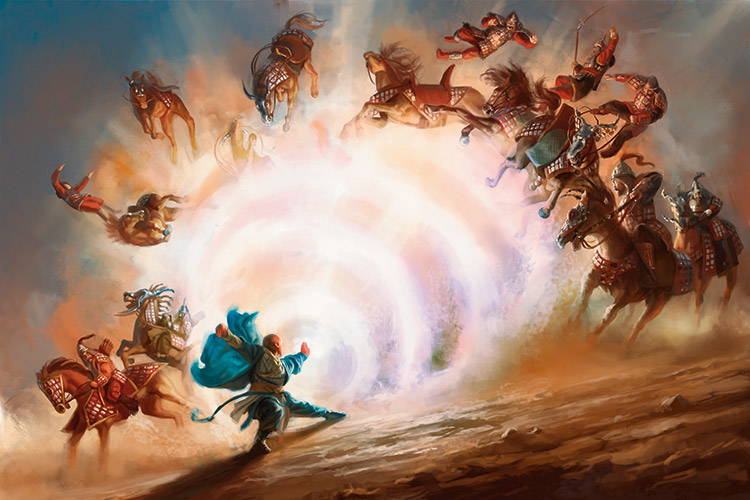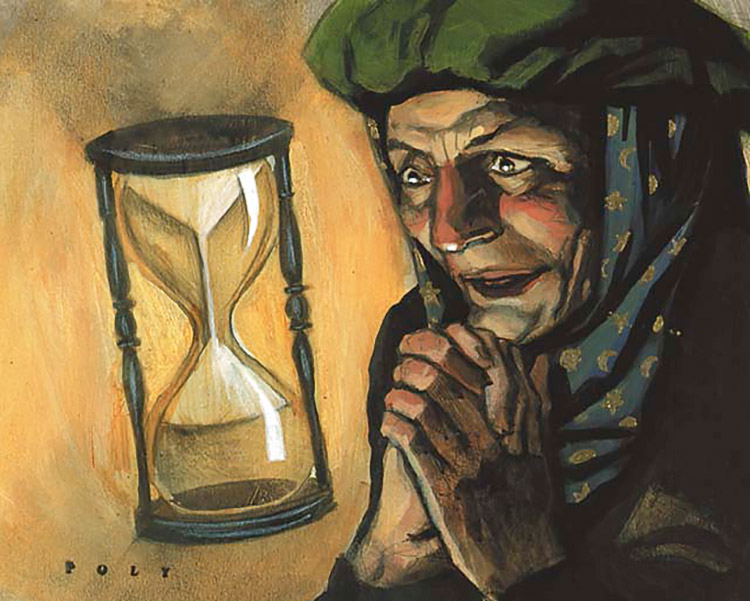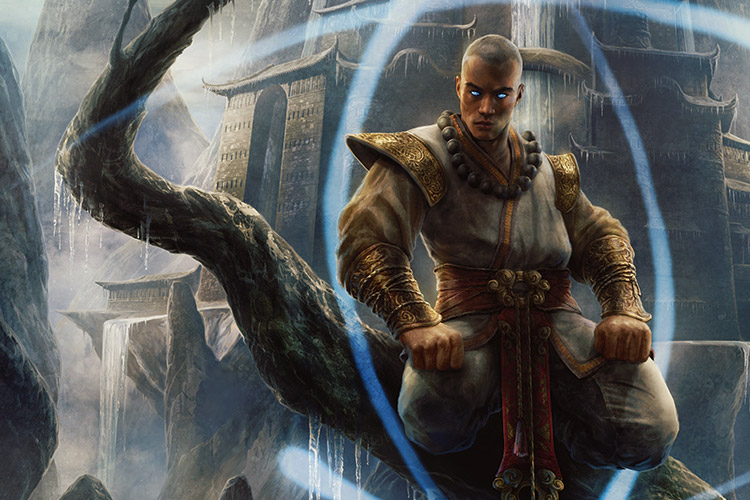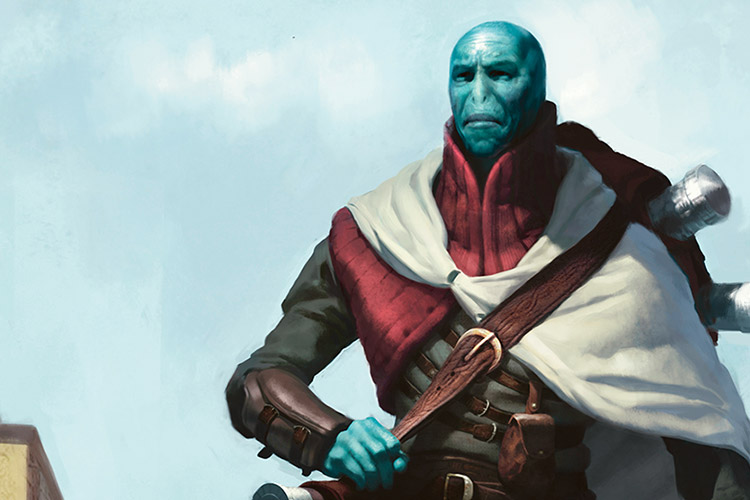Playing in a Grand Prix: Part II
Last week, I offered some advice on how to approach playing in a big Magic tournament. Today, we'll delve into what you can do during and after the tournament to ensure that your experience is a great one.
The Role of Judges
Once the tournament begins, judges are in charge of running things. In essence, their job is to help the players have a positive experience. This includes making sure the tournament runs smoothly, and answering players' questions—both inside and outside of game play. Finally, they enforce policies designed to guide the tournament toward its most fair possible result.
If you find reading the dictionary a little too exhilarating, check out these three hundred pages worth of documents judges use to run tournaments: The Comprehensive Rules of Magic, the Tournament Floor Rules, and the Infraction Procedure Guide. The fact that judges are there to help us means that we players don't have to know all of this!

Library of Alexandria | Art by Drew Baker
This is a long-winded way of saying that, as a player, judges are your friends. They want to help you. They want to answer your rules questions and help you learn the game. They want to protect you against cheating or being the victim of an unfortunate misunderstandings in a game. Finally, they want you to have fun at the tournament and come back to play again in the future.
Unfortunately, for one reason or another, new tournament players are sometimes slow to ask judges for help. Perhaps they haven't gotten over the hall monitor being mean to them in elementary school—I really have no idea. The reality is that judges are very approachable at all times. Calling a judge during a match isn't "tattling," nor does it mean you're accusing your opponent of cheating. Judges are a wonderful resource, and it's a big mistake to not take advantage of what they have to offer.
Here's a short (far from exhaustive) list of things judges can help you with at a tournament:
- They can help you find things. Where to register for the tournament, where to find your pairings, where the bathroom is, anything.
- They can answer rules questions. This includes during a game or between rounds. Any time I encounter a question while I'm at home, I make a note to ask a judge about it at my next Grand Prix.
- If you have to get up to use the restroom, a judge will give you permission to go, and will even give you a time extension for your match.
- They can resolve any problems in your match. A disagreement, misunderstanding, miscommunication. "I attacked for 3 damage with my Tarmogoyf last turn, but now I realize that it should have been a 4/5." A judge can help!
- They can address the situation when either you or your opponent has taken an illegal action. Someone drew seven cards after taking a mulligan. Someone played two lands in a turn. Someone cast a spell without the proper mana. Someone flipped over a card while shuffling the opponent's deck. These things usually aren't big deals, but a judge needs to know about them. They'll take the proper measures to help you finish the game as fairly as possible, and they'll decide whether or not a Warning (or any stiffer penalty) needs to be issued.
Warnings
If you attend a Grand Prix, you'll see judges issue Warnings. You might receive a Warning yourself. This is because Warnings are common, and they're no big deal. A Warning is basically an official statement of a judge saying, "Please try not to do this again." However, it does not come with a penalty attached to it. Don't worry if you receive a Warning at your first tournament.
Warnings are tracked, and that's exactly the point. Everybody makes mistakes while playing Magic—everybody. Everybody has accidentally tapped the wrong lands for a spell, or accidentally knocked a card off the top of their library. However, judges want to know about and track these things. If a player is tapping the wrong lands for his or her spells five or six times in every match they play, it's possible that they're doing it intentionally in order to gain an advantage. Tracking Warnings can help judges identify and investigate players like this.
So if you receive a Warning, don't sweat it. If you receive two Warnings, try to tighten up your play, but don't let it upset you. If you receive three Warnings in the same day for the same infraction, you might get a penalty. If you have a long-term pattern of getting far, far too many Warnings, you might get a penalty, but this ought to be easy to avoid.
When to Call a Judge
If you're deciding whether or not to call a judge, just go ahead and call one. Remember, they're there to help!
Do not try to fix a problem on your own, like you would when playing with your friends at home. For example, let's say your opponent puts his or her creature into the graveyard when it wasn't actually supposed to die, and nobody notices until the next turn. If you were playing at home, you might just put it back onto the battlefield and continue the game, but you should not do this in a tournament. Always let judges handle situations like this.
Do not take your opponent's word for it if something is unclear.
Example A:
You cast Lose Calm on your opponent's face-down creature, and you're not sure whether or not you're allowed to look at what it is. Don't ask your opponent, ask a judge. (You are allowed to look at it).
Example B:
You take a mulligan, but then you lay out seven cards face-down on the table. Your opponent tells you that you're forced to mulligan down to five cards. Don't take his or her word for it, ask a judge. (If you haven't looked at the cards yet, you probably won't have to mulligan down to five).
Example C:
You tap five lands intending to cast a spell, but before you say anything or reveal the card, you change your mind. You're not sure whether or not you're allowed to untap your lands. Don't ask your opponent, ask a judge. (You will be allowed to untap your lands).
Never take your opponent's word on something that seems unclear to you. Your opponent does not have your best interest in mind. They might lie to you. Even more likely, they might just be mistaken. In either case, there's no reason to let it impact your tournament.
How to Call a Judge
First, let your opponent know what's going on. "I have a rules question, so I'm going to call a judge," or, "I noticed that you only had one white mana when you cast End Hostilities, so I'm going to call a judge."
Next, raise your hand and yell, "Judge!" Yell pretty loudly, and keep your hand raised, because tournaments are often crowded and noisy. A judge will come over as soon as he or she sees you.
Explain exactly what happened, with no details left out, and none of your own speculations added. The judge may ask both players for their side of the story, or will at least make sure that both players agree on the facts.

End Hostilities | Art by Jason Rainville
The right way: "John tapped these five lands and cast End Hostilities. Then he put his creatures in the graveyard. I picked up my creatures, but before I put them in the graveyard, I noticed that John only had one white mana, so I put them down again and called for a judge."
The wrong way: "My opponent tried to cheat me! He knew the only way he could win was playing End Hostilities, so he tried to do it illegally without me knowing!"
The judge will make his or her ruling. This might happen immediately, if the situation is relatively simple. It may take some amount of time if there's a disagreement, if the judge chooses to investigate further, or he or she wants to confer with another judge about it. The ruling may include an in-game fix (perhaps rewind to before End Hostilities was cast), it may include a penalty (such as your opponent receiving a Warning for improperly casting a spell), and you may be issued a time extension to finish your match.
If you feel that the judge hasn't handled the situation properly, you may appeal the ruling. This means getting a second opinion from the head judge. Let the first judge finish speaking, and then say, "I'd like to appeal that ruling." The head judge will weigh in, and his or her decision will be final.
Be Nice to Judges
Judges are people, and specifically they're people who volunteer an almost inconceivable amount of their time to the game we love. Without judges, we couldn't have tournaments the way we have them now.
They can also make mistakes. Just like players, judges can range widely in their level of experience. This is part of the reason why there is an appeal system. Don't be afraid to appeal a ruling, but always do so respectfully.
Finally, judging can sometimes be a thankless job. Any time there's a dispute, the judge has to make a decision that will likely make one or both of the players unhappy. If a ruling doesn't go your way, try to roll with the punches, don't take it personally, and certainly don't take it out on the judge who made the ruling.
The Clock
In discussing judges, I've mentioned time extensions, but haven't yet explained exactly what that means.
In a Grand Prix (and most tournaments, for that matter), you get 50 minutes to play a best two-out-of-three match. You cannot begin playing before the clock starts, and cannot ignore it when the clock gets to zero. When the clock gets to zero, if you received a time extension for any reason (a judge ruling or a bathroom break, for example), you'll play for that much longer, and then you'll play five additional turns. If it's your turn when time is called, then when you say "go," your opponent's turn will be turn one, your next turn will be turn two, etc. If the game doesn't end before the end of the fifth turn, the game is a draw.

Sands of Time | Art by Paul Lee
If game two is a draw, then whichever player won game one wins the match. If your match ends with game one or game three being a draw, then the entire match is a draw. In a tournament, your standings are based on receiving three match points for a win, one match point for a draw, and zero match points for a loss.
Even from that simple system, it's easy to see that draws are bad. When there's a winner and a loser, three total match points are awarded. When the match is a draw, only two match points are awarded. You'd rather win one match and lose one match than to draw two matches in a row.
However, draws are even worse for your tournament chances than that system might hint at. Grand Prix tournaments are very large, and very top-heavy. Many thousands of players enter, but only a few hundred make Day Two, and only a fraction of those win prizes. In other words, you're looking to hit a home run, not simply to stay in the middle of the pack.
Certain cut-offs, like the one to qualify for Day Two, are based on your number of wins (you need seven wins to play on Day Two). So for those purposes, a draw is the same as a loss. From experience, I can tell you that it feels lousy to miss Day Two with a record of 6-2-1 (six wins, two losses, and one draw).
Thankfully, 50 minutes is a pretty long time, so it's not as though you're playing Spit or some other lightning-speed game. However, you should make every effort to finish your matches on time. Play at a brisk pace yourself and don't take more than a few minutes to shuffle and sideboard. Make sure that your opponent does the same.
If your opponent is taking too long, you're within your rights to ask them to speed up, or to call a judge. Remember that these things are written into the rules. You must play at a fair pace at all times, you can't take too long on any one decision, and you cannot slow down your pace of play because you want the game to be a draw. The guideline is that you shouldn't take much longer than three minutes to sideboard and shuffle between games (although this is not a hard-and-fast rule).
Even if it's early in the match, or if it looks like you're going to finish in plenty of time, both players still need to play at a fair pace. If the rules say that you get a certain amount of time to make a decision, then taking more time than that gives you an unfair advantage!
Get in the habit of playing briskly, because you want to finish your matches in time. Don't rush your opponents, but don't let them take more time than the rules allow, and don't let them put you at the risk of running out of time on the clock.
Playing Out All of Your Rounds
Day One of a Grand Prix consists of nine rounds of Swiss play. This means that all players (who wish to do so) will play all nine rounds, and then the cut to day two will be based on their final records or standings. Your record will carry with you if you make Day Two, so finishing 9-0 or 8-1 is fantastic, but once you lose three rounds, you won't be making Day Two regardless of what happens for the rest of the day.
Nonetheless, I encourage you to stay in the tournament, and play out all of the rounds no matter what your record is. (That is, unless you'd be missing out on a side event you want to play, or unless you're feeling sick or are otherwise miserable continuing to play).

Art by Jason A. Engle
Tournament experience is tremendously valuable, and is very hard to come by. Playing games at home, or at your local store really cannot simulate the experience of playing in a Grand Prix. At a big tournament, you're paired against new opponents in a highly competitive setting. Everyone brought their best deck, and is trying their hardest to beat you. It's the best practice you can get!
Playing in Grand Prix will make you a better player. Even if you find yourself with a record of 1-3, you should still make the most of the day. After all, you've already travelled to the event, paid the entry fee, built your deck, and blocked a day out of your calendar. Why let the chance to gain tournament experience go to waste?
If you play out the rounds, you'll inevitably learn more about the format, learn more about your deck, and you can continue to work toward any goals that you might've set for yourself before the tournament.
Reflection
Always look at a big tournament as a learning experience. Whether you win or lose, there will always have been some things you did well and some things you can work on. Take note of these things, and try to reinforce the good aspects of your game, and improve on the weaker aspects.
It can be hard to balance healthy reflection with your desire to do well in the tournament. If you make a big mistake in round six, you certainly do want to remember it and learn from it for next time. However, you don't want to be thinking about it while you're playing rounds seven, eight, and nine!

Art by Chase Stone
For that reason, I recommend blocking out some time after the tournament for reflection. The car ride home on Sunday or Monday night is perfect. Just as good as personal reflection, you might be able to talk things over with friends. What did everyone learn, what were they proud of themselves for, what would they change for next time?
If you block off time after the tournament for reflection, it also means that you're free to keep a clear head while you're playing. Focus on the task at hand, not on what happened last round or what record you want to have at the end of the day. If you make a mistake, brush it off and make the best of the situation. Revisit it only once everything is said and done.
All in all, there's nothing like playing in a Magic tournament. If you can be present and focused throughout, you're sure to have a positive experience. Friends, judges, and other tournament officials will give you the resources to have a great time playing in a Grand Prix. In the end, though, it's up to you to make the most of it.

